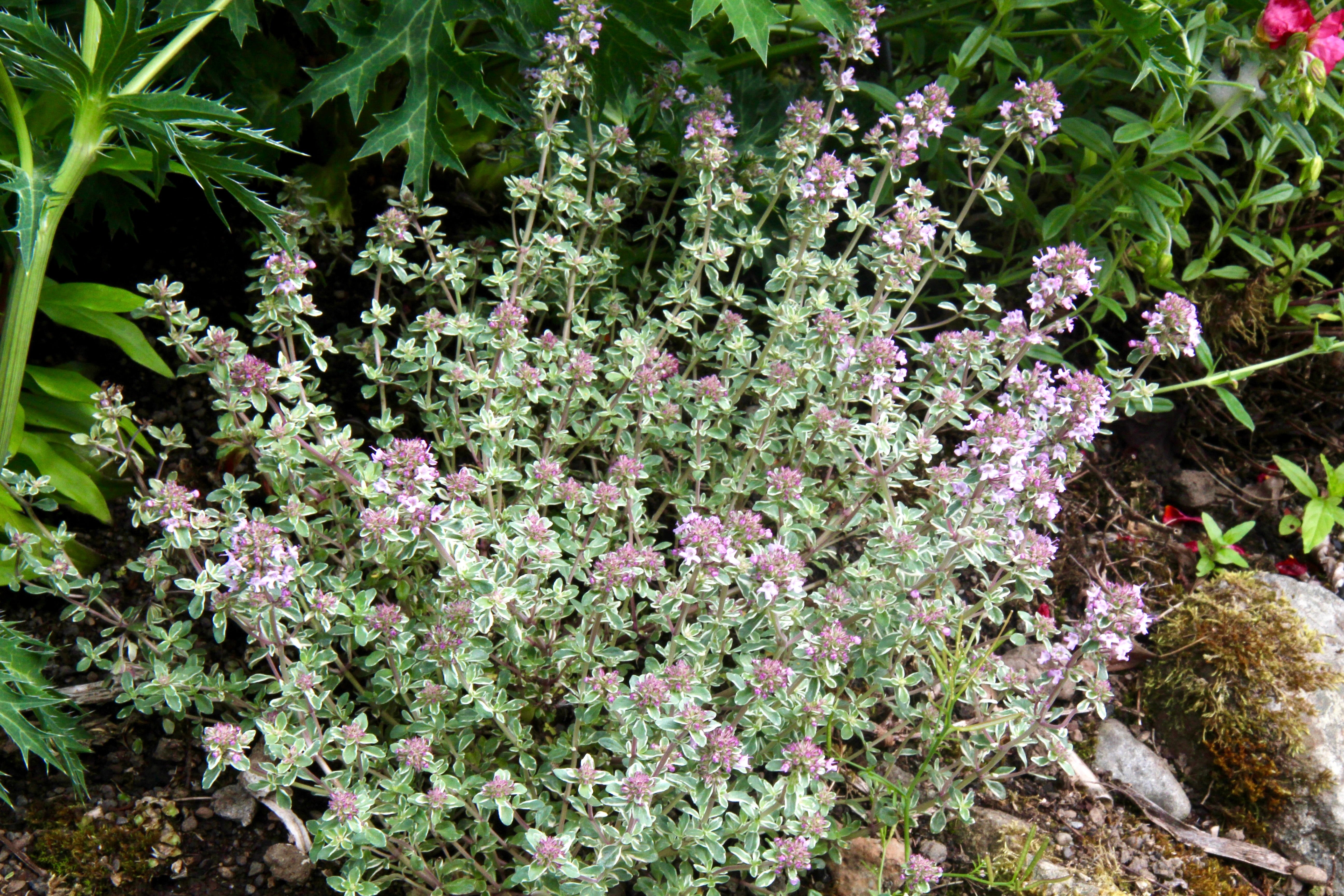Thymus 'Silver Posie'
Approx. 0.5 litre pot
About this cultivar:
Thymus 'Silver Posie' delights with its vibrant display of bright purple to white flowers during late spring and early summer. Its enchanting grey-green leaves, adorned with white margins, emit a delightful aroma. This bushy, creeping thyme serves as an exceptional ground cover, ideal for sunny rock gardens or as edging along paths and borders. Its aromatic foliage adds flair to culinary creations, perfect for crafting bouquet garnis, stuffings, and sauces.
- Position: Full sun, partial shade
- Soil: Almost any soil, grows well in Ballyrobert (in dryer areas like beside paths)
- Flowers: May, June
- Other features: Bees and Butterflies, Scented, Interesting Foliage or Fruit
- Hardiness: H5 - Hardy in most places throughout the UK even in severe winters (-15 to -10°C), Fully hardy, grows well in Ballyrobert
- Habit: Clump forming, bushy
- Foliage: Deciduous
- Height: 45 - 60 cm (1.5 - 2 ft)
- Spread: 30 - 60 cm (1 - 2 ft)
- Time to full growth: 2 to 5 years
- Plant type: Herbaceous Perennial
- Colour: Green, pink
- Goes well with: --
About this genus:
Thyme is a genus bursting with over 350 aromatic perennial herbs from the mint family, Lamiaceae. These plants are the rockstars of the gardening world, celebrated for their culinary delights, medicinal wonders, and aesthetic charm, making them a must-have in gardens around the globe. Even if your soil is mostly wet….
The name "Thymus" has deep roots in Ancient Greek, stemming from "thýmos," embodying qualities like courage, strength, and sacrifice. This linguistic nod reflects the profound respect thyme has garnered through the ages, associated with bravery and vitality, often playing a role in rituals, ceremonies, and remedies.
The ancient Greeks didn't just admire thyme from afar; they burned it as incense in temples, believing its aromatic smoke could infuse courage and blessings into those who breathed it in. Romans, too, held thyme in high regard for its antiseptic powers, using it to cleanse spaces and baths.. Throughout history, thyme adorned wedding bouquets, served as a token of affection, and symbolized elegance and grace.
Thyme isn't just a pretty face in the garden; its aromatic leaves pack a punch in both the kitchen and the medicine cabinet. Common thyme, a kitchen staple, adds flavor to dishes worldwide, while its antimicrobial and expectorant properties have made it a go-to remedy in teas, tinctures, and ointments.
Originating primarily from the Mediterranean region, Thymus species have spread across temperate climates worldwide. Their native habitat is rocky, well-drained soils, around sunny hillsides, meadows, and rocky outcrops. Their adaptability to diverse environmental conditions has facilitated their naturalization in various habitats, from alpine slopes to coastal cliffs. Though the ones we offer are handpicked for their ability to handle our slightly damper, aka wet, aka sodden, conditions at Ballyrobert. We don’t have many dry areas in Ballyrobert, so we keep them in pots or around dryer areas like paths and border edges.
These versatile plants boast distinctive features: small, fragrant leaves in shades of green, gray, and silver, and delicate flowers in dense terminal heads that attract pollinators like bees and butterflies. Stems tend to be narrow or even wiry; leaves are evergreen in most species, arranged in opposite pairs, oval, entire, and small. In gardens, they wear many hats, from groundcover suppressing weeds to cascading elegantly in rock gardens, softening harsh edges with their beauty and aroma.
In gardens, Thymus species serve multifaceted roles. As low-growing groundcovers, they form dense mats, suppressing weeds and erosion while releasing their aromatic fragrance with each step. In rock gardens and crevices, they cascade elegantly, softening harsh edges and providing visual interest.
Thyme's adaptability to dry, sunny conditions makes it a favourite among gardeners seeking low-maintenance plants. Once established, it requires minimal watering and upkeep, thriving in neglectful environments – such as back door container gardens. But again I should state that the ones we sell will be the more versatile selections that should do well in reasonably wet soils! Routine pruning and maintenance can help manage their spread and encourage compact growth.
In summary, the genus Thymus offers a diverse array of aromatic herbs prized for their culinary, medicinal, and ornamental value. Whether adorning herb gardens, rockeries, or culinary landscapes, thyme remains a timeless choice for enriching our lives with fragrance, flavour, and beauty.


